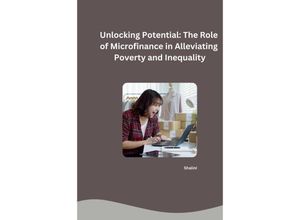Poverty and inequality cast long shadows. Unlocking Potential: The Role of Microfinance in
Alleviating Poverty and Inequality explores microfinance a financial tool that empowers
individuals to break free from these cycles.Imagine communities where small loans unlock a
world of possibilities. Microfinance offers a glimmer of hope:Breaking Barriers: Microloans
provide crucial capital to those excluded from traditional banking systems fueling small
businesses and income generation.Empowerment and Agency: By becoming self-employed individuals
take control of their economic destinies fostering self-sufficiency and dignity.Ripple Effect:
Microfinance institutions often prioritize women borrowers potentially leading to positive
social change within communities.However challenges remain:Debt Trap Potential: High interest
rates and short repayment periods can trap borrowers in a cycle of debt negating the
benefits.Sustainability Concerns: Focus on short-term loans may not address long-term financial
needs or promote sustainable business development.Limited Reach: Microfinance may not be a
universal solution and broader structural reforms are needed for widespread poverty
reduction.Despite these limitations microfinance offers valuable insights:Responsible
Practices Matter: Sustainable interest rates client protection measures and business skills
training are crucial for effective empowerment.A Piece of the Puzzle: Microfinance should be
part of a comprehensive strategy that includes access to markets education and infrastructure
development.Beyond Numbers: The human narrative - stories of resilience and setbacks - is key
to refining microfinance practices.Microfinance has the potential to be a powerful tool in the
fight against poverty and inequality. By acknowledging challenges fostering responsible models
and learning from experiences microfinance can play a crucial role in unlocking the potential
of individuals and communities around the world.

